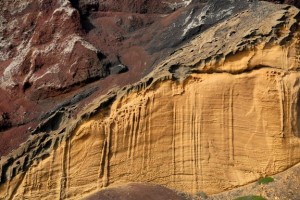Monday
Featured StoriesBuddhism and Ecology: Environment as our Teacher
By Chris Tamdjidi
In the year 2009, contemporary society finds itself in a state of shock. For many years it seemed that financial wealth could grow inexhaustibly – that it was just a matter of productivity, globalisation, open markets and free trade for the rain of monetary blessings to fall on all of us. With the collapse in the world financial markets, many of these assumptions have been shattered and it seems that our karma, the inevitable effects of previous actions, are catching up with us.
This shock may be a prelude to a far more profound and far reaching impact only beginning to dawn on us. We are drenched in the waters of a financial markets wave that has crashed onto us, but behind us a far larger wave is building up. We are beginning to realise that human civilisation is having a far-reaching, unpredictable and inevitable effect on the global environment. It is so far reaching that no one can yet describe all the areas of life on earth that will be impacted. It is unpredictable in that we do not know what what chain reactions will be set off and where these will lead. And yet it is inevitable – it is clear that a chain of events has been set into motion that we cannot stop.
View a German version of this article.
Our lifestyle in the 21st century makes huge demands on the environment. We use more and more resources like fossil fuels, timber and water without any understanding of what the outcomes will be. We think we need all kinds of gadgets, toys and machines without stopping to think if these are really important and useful to us. Sometimes there seems to be no natural limit to human desires. But there is a limit to how much Mother Earth can sustain us and we cannot afford to indulge in our desires unthinkingly.
– His Holiness the 17th Karmapa
For more than a century the benefits of modern technology, social developments and material progress made us feel like lords of the universe. We did not contemplate fully the result of our actions and now the results are catching up with us. We will all suffer, even though we wish all being to be free of suffering. At the same time, we know that a path of awakening always starts with suffering.
Interdependence
It is winter and I would like to buy an apple. Apples do not grow in winter in Germany; they do grow in Chile during our winter. Such apples, flown from Chile in the bellies of planes can be bought in my local supermarket. But as I am about to buy one, I think of the all the carbon dioxide that has been emitted in flying it here. I hesitate. German apples are also available. They are stored for months at a time in large storage halls, kept cool and in an atmosphere with formaldehydes. I have heard that less carbon dioxide is emitted flying apples here from Chile than it takes to grow them and store them in Germany. Someone else reminds me that fruit has been one of the main drivers of development of countries like Chile, and that because of these fruit the standard of living, education, literacy and life expectancy has gone up in Chile. And I also know that farming in Germany is a very hard lifestlye and that many farmers essentially live in poverty.
My hand is caught in a web – I hesitate not knowing what to chose. I just wanted to buy an apple and now I am connected by a thin strand to children in Chile, to farmers near the Bodensee.
Modern life – with its wealth of information and rapid globalisation – has shown us that we live in a web of interdependence. Shopping in Cologne, I am deeply connected to so many parts of the world and actually can make choices that affect people I will never meet, whose language I do not understand. If we open up to it, we can be profoundly struck by deep teachings of interdepencence. What the Buddha realised sitting under the bodhi tree, we can realise at Lidl or Aldi. All things are connected. My apple does not exist independently of children in Chile. Without Chile, my apple does not exist. It has no independent existence independent of children in Chile.
When this is, that is.
From the arising of this comes the arising of that.
When this isn’t, that isn’t.
From the cessation of this comes the cessation of that.– Samyutta Nikaya 12.61
Thich Nat Hanh, the renowned Vietnamese monk coined the phrase “interbeing” to represent the Buddhist principles of impermanence and the characteristic of “not-self” which reveals the inter-connectedness of all things.
The environment is very important not only for this generation but also for future generations. If we exploit the environment in extreme ways, even though we may get some money or other benefit from it now, in the long run we ourselves will suffer and future generations will suffer. When the environment changes, climatic conditions also change. When they change dramatically, the economy and many other things change as well. Even our physical health will be greatly affected. So this is not merely a moral question but also a question of our own survival.
– The Dalai Lama
Mindfulness and Virtue
We have to learn to live mindfully. If we let ourselves be deeply touched by this truth, we may feel like someone trapped in a tangled web of thorns or a spiders web. There is no way that we can fathom all the consequences of each of our actions. The chain of interconnections is endless. Just think about our consumption, about our travel, about our energy use, about our investments.
Yet we cannot allow ourselves to become trapped in hesitation and stop living – becoming so paranoid about the consequences of our actions that we stop doing anything at all. The only way we can live is to begin the tread the path of our lives with mindfulness. This is the basic Buddhist practice of coming back to the present moment, being mindful of here and now, and engaging in the world mindfully.
Being mindful of what we are about to do, we can actually use our discriminating intelligence to make decisions. Unraveling our attachments to good and bad, liking and disliking, we can learn to simply accept or reject based on what is harmful or beneficial to the situation and to our environment. There is an exciting field of ethics open for us to explore – a pragmatic, intelligent and sane look at what is helpful and what is not helpful. It is very practical, nothing too religious. Taking care of nature is like taking care of our house. There are no more hidden rooms where we can hide the trash.
It is not difficult to forgive destruction in the past, which resulted from ignorance. Today, however, we have access to more information, and it is essential that we re-examine ethically what we have inherited, what we are responsible for, and what we will pass on to coming generations.
– The Dalai Lama
The Bodhisattva Path
Living mindfully, we are immediately confronted with the question of our motivation. We begin to make decisions not only for our own immediate pleasure, but perhaps for our future or the future of our children. Then we may begin to consider other people and the future of other people. Or we may begin to make decisions for other beings that are furry and cute or for other beings that are ugly and scary. As we continue on such a path of mindful decision making, we expand our priorities from ourself and now, to others and to the future. Eventually, we can step into simple openness. We do not cling to our benefit, but can actually work with surrendering our attachments. We can actually engage fully and thoroughly as bodhisattvas, concerned not just with our own pleasure, but with the universal survival of all sentient beings. We need to and can embrace universal responsibility.
Rediscovery of Sacred World
Throughout history human beings have venerated nature and deities associated with nature. We might think this is an outdated thought. But if we begin to engage with the natural world with tremendous appreciation and mindfulness, born from openness and a genuine heartfelt motivation, we might begin to redisover the sacredness of the world. We might suddenly meet the intense “treeness” of a tree, we might be suddenly struck by the beauty of a forest glade in the late afternoon light, or the intensity and vividness of a hailstorm in autumn. This is the discovery of magic in our environment.
In ancient times, people referred to this discovery of intense wakefulness and power in nature as local gods. The wakefulness and power of nature is real. It is as real as we are. When we realise that we do not exist in an independent manner, we can accept that these powerful moments of wakefulness are as real as we are. They do not exist independently of wakeful consciousness, but they exist. And we can supplicate this energy. Just as meditative practitioners supplicate deities to awaken their own spiritual energies, we can also supplicate these natural deities to re-awaken the basic healthiness of the environment.
Since negligence of the environment – which has resulted in lots of harm to the human community – came about by ignorance of the very special importance of the environment, I think it is very important first of all to instill this knowledge within human beings
– The Dalai Lama
In the Shambhala tradition, it is said that in order to protect the environment, to rediscover its magic, we need to appreciate it and to work with natural deities just as much as we work with other deities in vajrayana. And in fact working with these deities is a way to purfy our own confused relationship with the interconnected web of being we call the environment.
When Dawa Sangpo, who received the Kalachakra tantra from the Buddha, first went to see the buddha, he said to him: “I am a King and I have a Kingdom. I have responsibility which I cannot surrender. I cannot surrender the senses and be like your monks.” The Buddha in his infinite compassion and wisdom taught him the Kalachakra tantra, including instructions on how to use his senses in a pure manner, how to see the world as sacred, and how to create an enlightened situation for all people in his kingdom. These teachings are especially important for us as we contemplate how to protect the environment and in fact our whole, global interconnected web of being.
There is a traditional prayer taken by those aspiring to be bodhisattvas:
As earth and the elements provide sustenance for countless sentient beings
So may I too become sustenance for all sentient beings
To the limits of space, until all have attained nirvana.
Sometimes this may seem conceptual. But the environment is our teacher, and we are learning that we cannot avoid this responsibility to care for the whole world. For if we do not work tirelessly to protect the whole world, we ourselves might not have a future. The environment is truly a profound teacher.
Photo Credits: Spigolo

Chris Tamdjidi just retired after seven years as Director of Shambhala Europe. He is now focusing on setting up a contemplative hotel in Germany as well as a contemplative training programme for Shambhala leaders and other businesspeople. He lives with his wife and two children in Cologne, Germany.










May 8, 2011
Reply
Inward analysis leads to outward synthesis! :)
Jun 30, 2009
Reply
Thanks, Chris, you have made a wonderful weaving of the warp & weft of “living green” and mindfully. There are no linear answers, just an invitation to consider deeply and avoid reactivity.